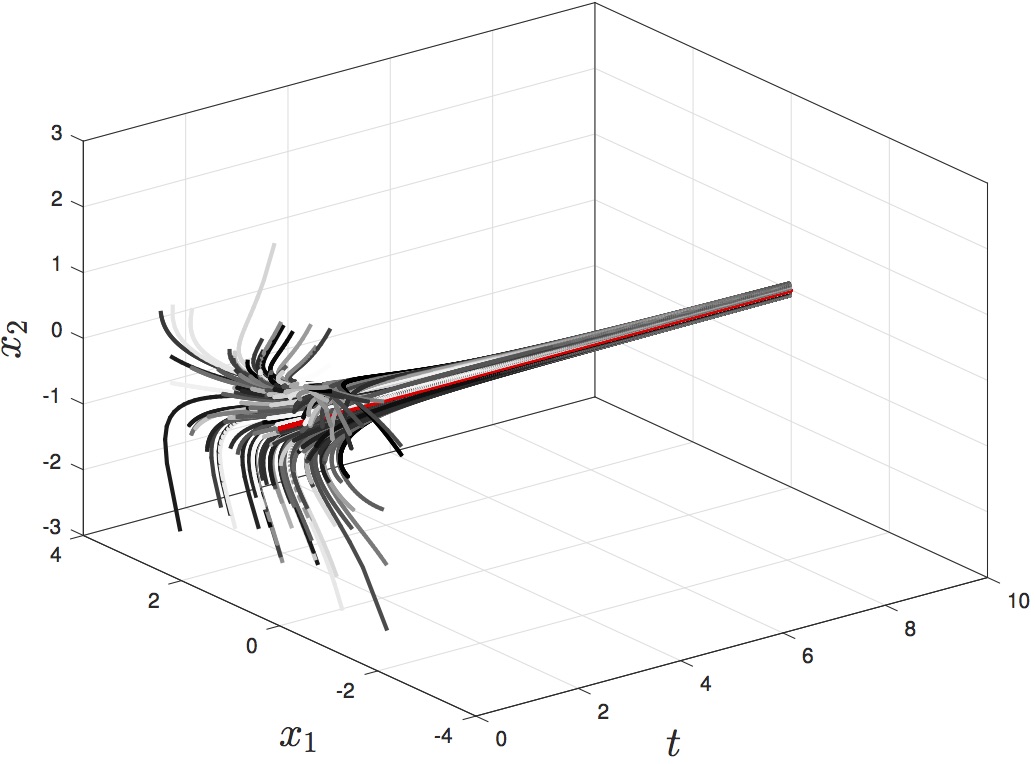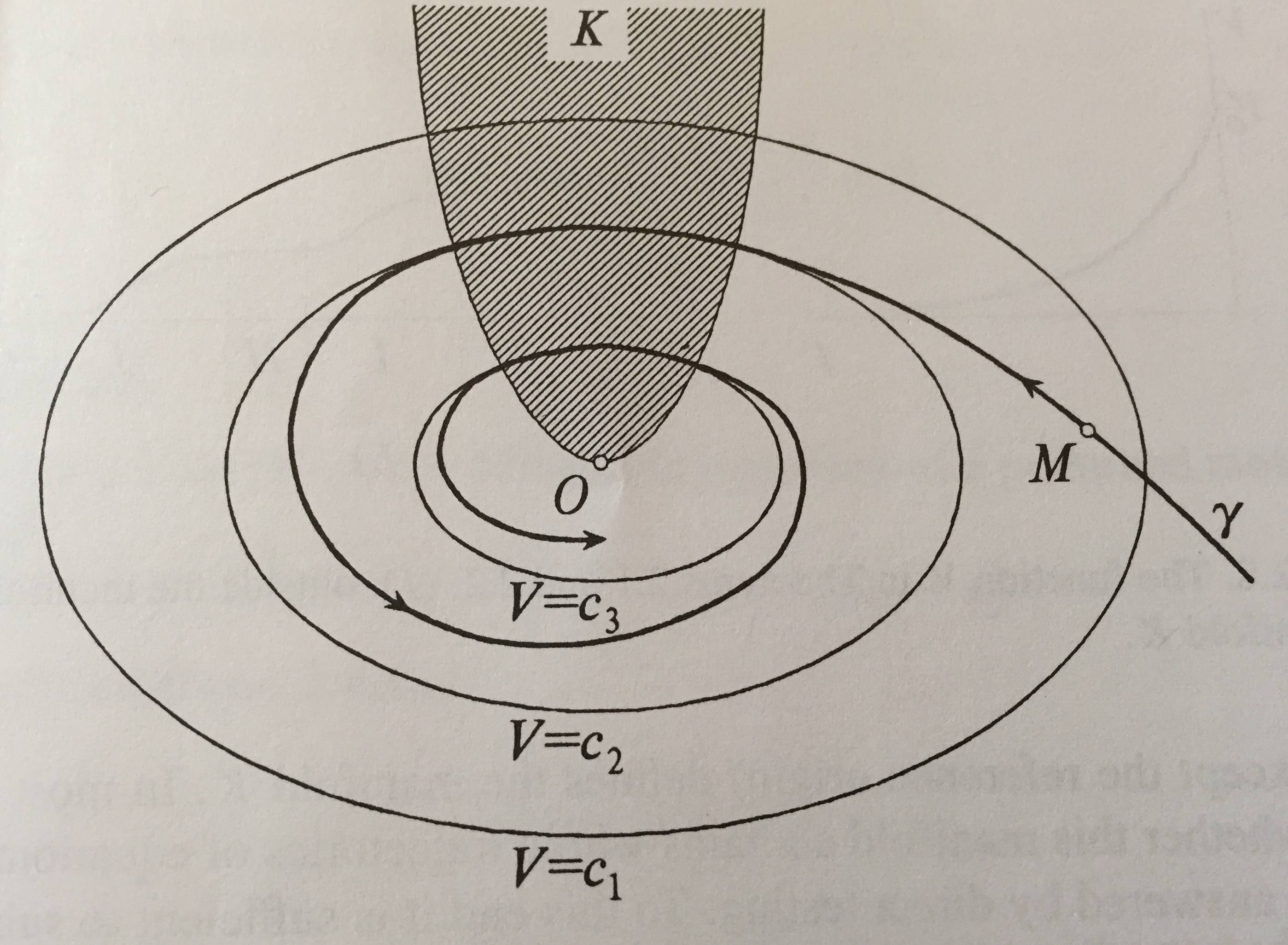Yes, there do exist sufficient conditions for asymptotic stability when the Lyapunov function is negative semi-definite, which I describe below.
Krasovsky's Theorem
Given an autonomous ODE $\dot x = f(x)$ with fixed point at the origin.
Let $K$ be a manifold that does not contain entire trajectories of the ODE. If there exists a Lyapunov function $V$ such that the orbital derivative $\dot V$ satisfies:
- $\dot V<0$ outside of $K$
- $\dot V=0$ on $K$
then the dynamics is asymptotically stable.
If $K = \{ x ~:~ F(x)=0\}$, here is a sufficient condition for $K$ to not contain entire trajectories of the ODE: $$
(f^T \nabla F)(x) \ne 0 \quad \text{on $K \setminus \{ \mathbf{0} \}$}
$$ where $f$ is the vector field of the ODE. (This just ensures that the vector field $f$ is never orthogonal to the normal to the surface.)
Example
Consider the ODE: $
\dot x_1 = -x_1 + 3 x_2^2 \;, \dot x_2 = - x_1 x_2 - x_2^3 \;.
$ In this case, a Lyapunov function is given by $V(x_1,x_2)=(x_1^2+x_2^2)/2$, whose orbital derivative is negative semi-definite. The set where $\dot V=0$ is given by the zero level set of the function $F(x_1,x_2)=x_1 - x_2^2$. Note that $(f^T \nabla F)(x_1,x_2) = 2 x_2^2 + 4 x_2^4 \ne 0$ on $K \setminus \{ \mathbf{0} \}$. Thus, by Krasovsky's Theorem the origin is asymptotically stable as illustrated in the graphic below.

In this graphic, two of the axes correspond to state variables $x_1$ and $x_2$, and the other axis is the time variable $t$. The red line marks the state $x_1=0$ and $x_2=0$ for the time interval shown. Different grey shading is used for trajectories with different initial conditions.
ADD
Here is a cartoon from the book referenced below, which illustrates the idea behind Krasovsky's Theorem. The dark line labelled $\gamma$ represents a solution of the ODE, the lighter lines are contour lines of the semi-definite Lyapunov function $V$, and the dashed region is $K$ where $\dot V=0$.
 This cartoon nicely illustrates how the dynamic avoids getting stuck inside $K$, and instead, asymptotically reaches a fixed point. Note that if the ODE solution enters $K$ then the value of the Lyapunov function does not change. This is illustrated by the curve remaining on a level curve of $V$ in the dashed region labelled $K$. However, eventually the ODE solution must exit $K$ (by hypothesis of Krasovky's Theorem), after which the Lyapunov function again decreases.
This cartoon nicely illustrates how the dynamic avoids getting stuck inside $K$, and instead, asymptotically reaches a fixed point. Note that if the ODE solution enters $K$ then the value of the Lyapunov function does not change. This is illustrated by the curve remaining on a level curve of $V$ in the dashed region labelled $K$. However, eventually the ODE solution must exit $K$ (by hypothesis of Krasovky's Theorem), after which the Lyapunov function again decreases.
This picture suggests that a set of non-isolated fixed points can be reached in this fashion.
Reference
David R. Merkin [1997]. Introduction to the Theory of Stability. Texts in Applied Mathematics. Springer. Translated from Russian by Andrei L. Smirnov and Fred Afagh.


 This cartoon nicely illustrates how the dynamic avoids getting stuck inside $K$, and instead, asymptotically reaches a fixed point. Note that if the ODE solution enters $K$ then the value of the Lyapunov function does not change. This is illustrated by the curve remaining on a level curve of $V$ in the dashed region labelled $K$. However, eventually the ODE solution must exit $K$ (by hypothesis of Krasovky's Theorem), after which the Lyapunov function again decreases.
This cartoon nicely illustrates how the dynamic avoids getting stuck inside $K$, and instead, asymptotically reaches a fixed point. Note that if the ODE solution enters $K$ then the value of the Lyapunov function does not change. This is illustrated by the curve remaining on a level curve of $V$ in the dashed region labelled $K$. However, eventually the ODE solution must exit $K$ (by hypothesis of Krasovky's Theorem), after which the Lyapunov function again decreases.